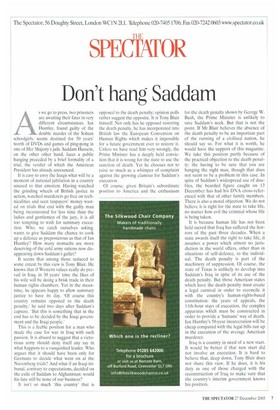SPECI E ATOR
Don't hang Saddam
As we go to press, two prisoners are awaiting their fates in very different circumstances. Ian Huntley, found guilty of the double murder of the Soham schoolgirls, seems destined for 50 years' worth of DVDs and games of ping-pong in one of Her Majesty's jails. Saddam Hussein, on the other other hand, faces a public hanging preceded by a brief formality of a trial, the verdict of which the American President has already announced.
It is easy to envy the Iraqis what will be a moment of national jubilation in a country unused to that emotion. Having watched the grinding wheels of British justice in action, watched murderers go free on technicalities and seen taxpayers' money wasted on trials that end with the guilty man being incarcerated for less time than the ladies and gentlemen of the jury, it is all too tempting to wish for summary execution. Who, we catch ourselves asking, wants to give Saddam the chance to cook up a defence as preposterous as that of Ian Huntley? How many stomachs are more deserving of the cold army rations now disappearing down Saddam's gullet?
It seems that among those seduced to some extent by this view is Tony Blair. He knows that if Western values really do prevail in Iraq, in 30 years' time the likes of his wife will be doing a brisk trade in their human rights chambers. Yet in the meantime, he appears happy to allow summary justice to have its day. 'Of course this country remains opposed to the death penalty,' he said two days after Saddam's capture. 'But this is something that in the end has to be decided by the Iraqi government and the Iraqi people.'
This is a feeble position for a man who made the case for war in Iraq with such passion. It is absurd to suggest that a victorious army should deny itself any say in what happens to a vanquished leader. Who argues that it should have been only for Germans to decide what went on at the Nuremberg trials? And what if an Iraqi tribunal, contrary to expectations, decided on the exile of Saddam to Afghanistan: would his fate still be none of our business?
It isn't so much this country' that is opposed to the death penalty: opinion polls rather suggest the opposite. It is Tony Blair himself. Not only has he opposed restoring the death penalty, he has incorporated into British law the European Convention on Human Rights which makes it impossible for a future government ever to restore it. Unless we have read him very wrongly, the Prime Minister has a deeply held conviction that it is wrong for the state to use the sanction of death. Yet he chooses not to raise so much as a whimper of complaint against the growing clamour for Saddam's execution.
Of course, given Britain's subordinate position to America and the enthusiasm for the death penalty shown by George W. Bush, the Prime Minister is unlikely to save Saddam's neck. But that is not the point. If Mr Blair believes the absence of the death penalty to be an important part of the running of a civilised nation, he should say so. For what it is worth, he would have the support of this magazine. We take this position partly because of the practical objection to the death penalty: the having to be sure that you are hanging the right man, though that does not seem to be a problem in this case. In spite of Saddam's widespread use of doubles, the bearded figure caught on 13 December has had his DNA cross-referenced with that of other family members. There is also a moral objection. We do not believe it is right for the state to take life, no matter how evil the criminal whose life is being taken.
It is because human life has not been held sacred that Iraq has suffered the horrors of the past three decades. When a state awards itself the right to take life, it assumes a power which almost no jurisdiction in the world offers, other than in situations of self-defence, to the individual. The death penalty is part of the machinery of suppression. Of course, the state of Texas is unlikely to develop into Saddam's Iraq in spite of its use of the death penalty. But those American states which have the death penalty must create a legal carnival in order to reconcile it with the country's human-rights-based constitution: the years of appeals, the 11th-hour stays of execution, the complex apparatus which must be constructed in order to provide a humane' way of death. Ian Huntley's 50-year incarceration will be cheap compared with the legal bills run up in the execution of the average American murderer.
Iraq is a country in need of a new start. It would be better if that new start did not involve an execution. It is hard to believe that, deep down, Tony Blair does not share this view. If he does, it is his duty as one of those charged with the reconstruction of Iraq to make sure that the country's interim government knows his position.


























































 Previous page
Previous page